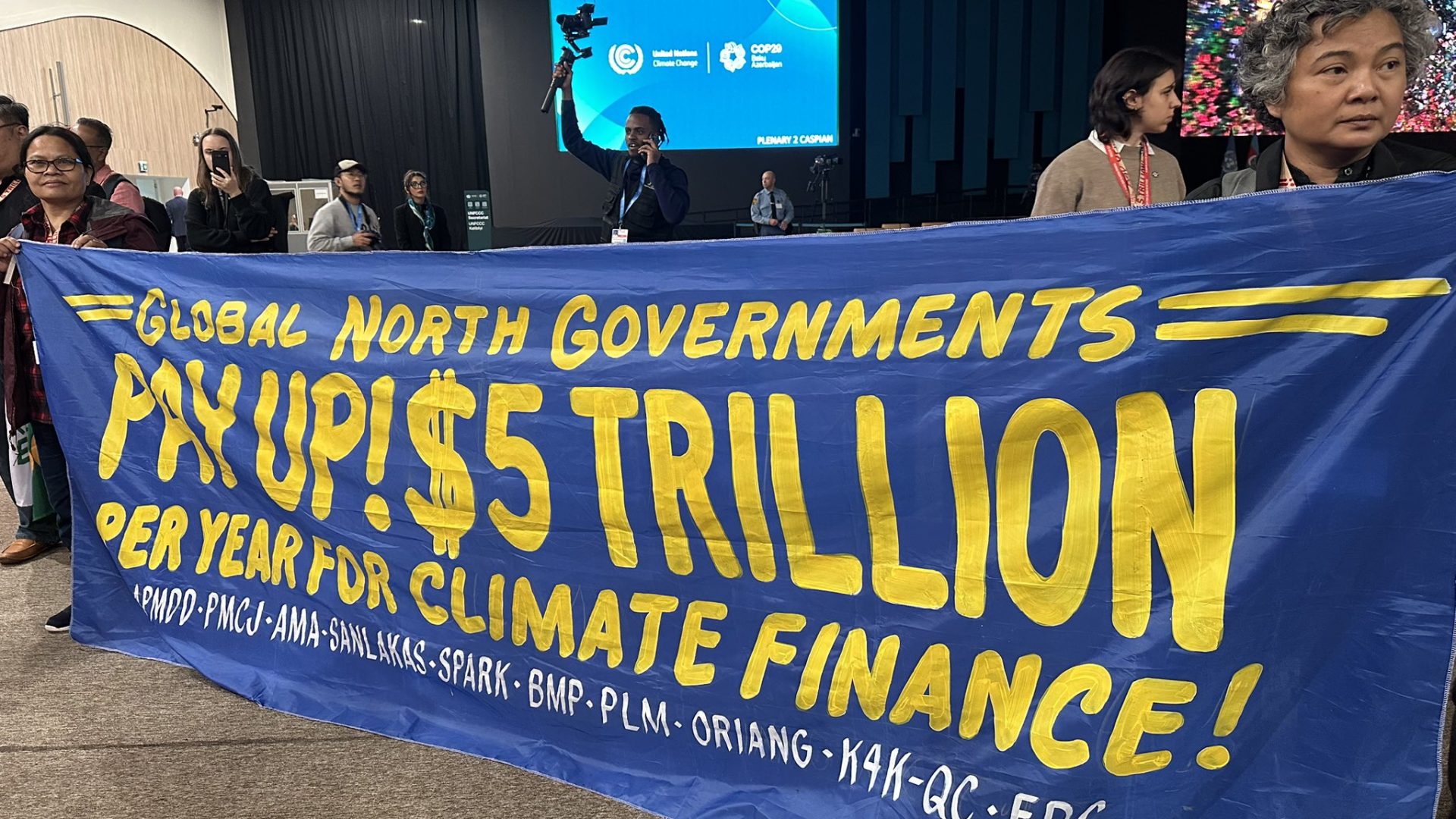
COP29 Dispatch: The Biggest Stories From Week 1
The first week of the UN climate negotiations just wrapped up in Azerbaijan. Our team on the ground has been working hard to push back against industry spin and pressure rich countries to pay up. Here are the highlights.

The first week of the UN climate negotiations (COP29) just wrapped up in Azerbaijan – and it has been a busy week!
Last year at COP28, we achieved something unprecedented: the world’s governments finally agreed to transition away from fossil fuels. Now comes the crucial next step – making rich countries put their money where their mouth is to fund this transition.
Right now we have a small team on the ground working hard to shift the negotiations in a positive direction. The UN climate talks are a (very) imperfect process, but they’re also a key moment each year where the world’s governments come together to try and make progress on addressing climate change.
The mood on the ground is mixed. The public finance narrative is breaking through, and we’re seeing encouraging signs from countries like Brazil. However, Trump’s concerning cabinet appointments and the shadow cast by the Azerbaijani government’s handling of the talks, are sobering reminders of the challenges we face. Yet the climate justice movement keeps showing up, shining a light on what needs to change.
Here are some of the key developments from week one:
- Big picture – it’s all about the money: Countries are negotiating their New Collective Quantified Goal on Climate Finance (NCQG) – essentially, how much money rich countries will commit to climate action. Our new analysis shows rich nations can mobilize over $5 trillion annually by ending fossil fuel subsidies, making polluters pay, and reforming unfair financial rules. The success of COP29 hinges on securing trillions every year in grants, not loans, for adaptation, mitigation, and loss and damage.
- On Friday we put out additional analysis showing private finance won’t cut it. While rich countries claim each dollar of public money can attract $5-7 in private investment, the real number is just 85 cents. This proves why we need real public grants that will reach communities most in need on fair terms, not private sector schemes that leave Global South countries drowning in debt.
- 1,770 fossil fuel lobbyists: The other big problem with this COP (and most COPs) is how much of a playground they can become for the fossil fuel industry. A shocking new analysis reveals over 1,770 fossil fuel lobbyists have been admitted to COP29 – more than all delegates from the ten most climate-vulnerable nations combined.
- Climate justice activists staged powerful demonstrations at the OPEC and Gas Exporting Countries Forum pavilions, demanding an end to this poisonous influence. Just as tobacco lobbyists are banned from World Health Organization summits, it’s time to kick big polluters out of climate talks. You can watch the video here.
- These fossil fuel industry lobbyists are not at COP just to be spectators. When they are not using COP as an opportunity to strike new deals, they are trying to advance dangerous distractions to climate change, aiming to keep fossil fuel production and expansion going on indefinitely. We saw the influence of this industry presence in the push for carbon markets based measures and a pledge on “low-carbon hydrogen.”
- A potential Trump-proof breakthrough at the OECD: A game-changing opportunity is emerging at the Organization for Economic Co-operation and Development (OECD), a grouping of many of the world’s richest countries, who could end $41 billion in annual oil and gas export subsidies in the coming days. Most OECD countries are ready to act – the Biden Administration’s decision will make or break this progress. Crucially, this would be a binding agreement that even a future Trump administration couldn’t undo.
- The courts weigh in: A court ruling in The Hague has acknowledged for the first time that new oil and gas investments are incompatible with international climate goals. While the court overturned specific emission reduction targets for Shell, it established two crucial principles: climate protection is a human right, and companies have a legal duty to reduce their climate pollution. Watch our public finance campaigner, Laurie van der Burg, talk about this case on BBC.
- Watch our press panels: We’ve also been on a lot of press panels at COP – you can see us talk about dangerous distractions threatening to prolong the use of fossil fuels and how oil is fueling colonialism and mass atrocities like what’s happening in Gaza.

There’s one more week of negotiations left and we’ll be pushing hard to get as much out of them – and out of the Biden administration in particular – as we can. The Global South is facing a worst-in-history debt and inequality crisis that is blocking climate action. They need real support for climate adaptation and mitigation, not more debt.
P.S. We now have a Bluesky account! You can follow us over at X and on Bluesky for more live COP29 updates.

